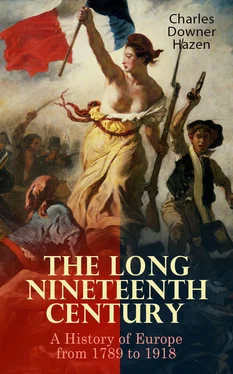During his youth no one thought that Louis would ever be monarch, so many other princes stood between him and the throne that his succession was only a remote contingency. But owing to an unprecedented number of deaths in the direct line this contingency became reality. Louis mounted the throne, from which eighteen years later, by a strange concourse of events, he was hurled. He had never been molded for the high and dangerous office. He was but twenty years old and the Queen, Marie Antoinette, but nineteen when they heard of the death of Louis XV, and instinctively both expressed the same thought, "How unhappy are we. We are too young to rule." The new King was entirely untrained in the arts of government. He was good, well-intentioned, he had a high standard of morality and duty, a genuine desire to serve his people. But his mind lacked all distinction, his education had been poor, his processes of thought were hesitating, slow, uncertain. Awkward, timid, without elegancies or graces of mind Louis XVI or body, no king could have been less to the manner born, none could have seemed more out of place in the brilliant, polished, and heartless court of which he was the center. This he felt himself, as others felt it, and he often regretted, even before the Revolution, that he could not abdicate and pass into a private station which would have been far more to his taste. He was an excellent horseman, he was excessively fond of hunting, he practised with delight the craft of locksmith. He was ready to listen to the advice of wiser men, but, and this was his fatal defect, he was of feeble will. He had none of the masterful qualities qualities of necessary for leadership. He was quite unable to see where danger lay and where support was to be found. He was not unintelligent, but his intelligence was unequal to his task. He had no clear conception of either France or Europe. He was a poor judge of men, yet was greatly influenced by them. He gave way now to this influence, which might be good, now to that, which might be bad. He was, by nature, like other princes of his time, a reforming monarch, but his impulses in this direction were intermittent. Necker said on one occasion, "You may lend a man your ideas, you cannot lend him your strength of will." "Imagine," said another, "trying to keep a dozen oiled ivory balls touching. I think you couldn't do it." So it was with the King's ideas. At the beginning of his reign Louis XVI was subject to the influence of Turgot, one of the wisest of statesmen. Later he was subject to the influence of the Queen to his own great misfortune and also to that of France.
The influence of women was always great in France under the Bourbon monarchy, and Marie Antoinette was no exception to the rule. Furthermore that influence was frequently disastrous and here again in the case of the last queen of the Old Regime there was no exception. If the King proved inferior to his position, the Queen Antoinette (1755-1793) proved no less inferior to hers. She was the daughter of the great Empress Maria Theresa of Austria, and she had been married to Louis XVI in the hope that thus an alliance would be cemented between the two states which had so long been enemies. But, as many Frenchmen disliked everything about this alliance, she was unpopular and exposed to much malevolent criticism from the moment she set foot in France. She was beautiful, gracious, and vivacious. She possessed in large measure some of the very qualities the King so conspicuously lacked. She had a strong will, power of rapid decision, a spirit of initiative, daring. But she was lacking in wisdom, in breadth of judgment; she did not understand the temperament of the French people or the spirit of the times. Born to the purple, her outlook upon life did not transcend that of the small and highly privileged class to which she belonged.
She had grown up in Vienna, one of the gayest capitals of Europe. Her education was woefully defective. When she came to France to become the wife of Louis XVI, she hardly knew how to write. She had had tutors in everything, but they had availed her little. She was willful and proud, unthinking and extravagant, intolerant of disagreeable facts, frivolous, impatient of all restraint, fond of pleasure, and of those who ministered unto it. She committed many indiscretions both in her conduct and in the kind of people she chose to have about her. Because of these she was grossly calumniated and misjudged.
Marie Antoinette was the center of a group of rapacious people who benefited by existing abuses, who were opposed to all reform. Quite unconsciously she helped to aggravate the financial situation and thus to hasten the catastrophe.
At the beginning of his reign Louis intrusted the management of finances to a man of rare ability and courage, Turgot. Turgot had been intendant of one of the poorest provinces of France. By applying there the principles of the most advanced economists, which may be summed up as demanding the utmost liberty for industry and trade, the abolition of all artificial restrictions and all minute and vexatious governmental regulations, he had made his province prosperous. He now had to face the problem of the large annual deficit. The continuance of annual deficits could mean nothing else than ultimate bankruptcy. Turgot announced his program to the King in the words, "No bankruptcy, no increase of taxation, no more borrowing." He hoped to extricate the national financial finances by two processes, by effecting economies in expenditures, and by developing public wealth so that the receipts would be larger. The latter object would be achieved by introducing the regime of liberty into agriculture, industry, and commerce.
Turgot was easily able to save many millions by suppressing useless expenditures, but in so doing he offended all who enjoyed those sinecures, and they flew to arms. The trade in foodstuffs was hopelessly and dangerously hampered by all sorts of artificial and pernicious legislation and interference by the state. All this he swept aside, introducing free trade in grain. A powerful class of speculators was thus offended. He abolished the trade guilds, which restricted economic production by limiting the number of workers in each line, and by guarding jealously the narrow, inelastic monopolies they had established. Their abolition was desirable, but all the masters of the guilds and corporations became his bitter enemies. Turgot abolished an odious tax, the royal corvee, which required the peasants to work without pay on the public roads. Instead, he provided that all such work should be paid for and that a tax to that end should be levied upon all landowners, whether belonging to the privileged or the unprivileged classes. The former were resolved that this should not be, this odious equality of all before the tax-collector. Thus all those who battened and fattened off the old system combined in merciless opposition to Turgot and, reinforced by the parlements particularly, and by Marie Antoinette, they brought great pressure upon the King to dismiss the obnoxious minister. Louis yielded to the vehement importunities of the Queen and dismissed the ablest supporter the throne had. Both monarchs were grievously at fault, the King for his lack of will, the Queen for her willfulness. "M. Turgot and I are the only persons who love the people," said Louis XVI, but he did not prove his love by his acts. A few days earlier Turgot had written him, "Never forget, your Majesty, that it was weakness which brought Charles I to the block."
This incident threw a flood of light upon the nature of the Old Regime. All reformers were given warning by the fall of Turgot. No changes that should affect the privileged classes! As the national finances could be made sound only by reforms which would affect those classes, there was no way out. Reform was blocked. Necker, a Genevan banker, succeeded Turgot.
Читать дальше












